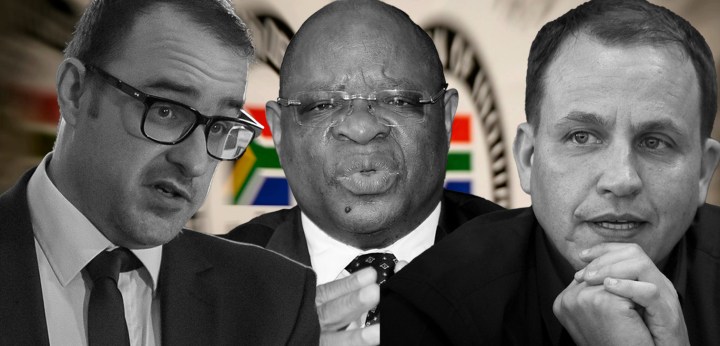DAYS OF ZONDO
Open Secrets weighs up the ‘good, the bad and the missing’ recommendations in commission’s reports

In the first two reports from the State Capture inquiry, Acting Chief Justice Raymond Zondo provided clear lists of suspects for potential prosecution, but his treatment of corporates was inconsistent and some of his recommendations concerning, said investigators from civil society group Open Secrets.
After submitting two reports from the State Capture inquiry, covering about 1,500 pages, Acting Chief Justice Raymond Zondo is under significant pressure to include in his final report a wide range of topics that he has so far excluded.
For example, providing a clear definition of “State Capture”, said Michael Marchant, head of investigations at Open Secrets on Tuesday.
Open Secrets is a non-profit organisation that began by investigating apartheid-era economic crimes but now also focuses on more recent economic crimes, often pointing out the direct line between past and present corporate malfeasance and impunity.
Marchant was speaking at a seminar on Zondo’s reports, hosted in Cape Town by the Tshisimani Centre for Activist Education.
“We certainly think that Justice Zondo has left himself a lot to do in the final report. There’s a huge amount of material that hasn’t been covered yet. The commission is clearly under a lot of pressure to get that material out,” said Marchant.
Zondo’s reference to racketeering in his Transnet report was a hint at how he understands State Capture, which Marchant described as “a systematic effort to repurpose our institutions for the private gain of a set of entities that are related”.
“What the commission shows unequivocally is that the Gupta family, in particular, were able to capture the procurement contracts of different SOEs [state-owned enterprises] systematically across different entities at the same time in a way that no one had been able to do before,” he said.
Marchant described Zondo’s recommendations as “the good, the bad and the missing”. Under each topic, Zondo has repeatedly listed each person or entity that should be investigated by the authorities for potential prosecution.
“I don’t think the commission would be recommending people for prosecution if it didn’t believe there was enough evidence basically to support that, and there are reams of people who need to be prosecuted,” he said.
“One of the central things I think that needs to be done is to put much greater pressure on the NPA [National Prosecuting Authority] to act with haste to prosecute people, remove them from the system and also to show a trend of accountability, to establish for people on a very basic level that there will be consequences, and that goes from the public service all the way through to the private enablers.
“I think it would do absolute wonders for the country if chief executives, senior bankers, senior auditors were prosecuted for their complicity in these types of crimes.”
Marchant and his colleague, Open Secrets investigator Zen Mathe, said Zondo’s reports were inconsistent in how they treated the companies that facilitated State Capture. Zondo recommended that authorities investigate Bain & Company’s role in the capture of the SA Revenue Service (SARS) and Nedbank for transactions at the Airports Company South Africa (Acsa).
But the report on Transnet was silent on the role banking giant HSBC played in laundering billions for the Gupta enterprise from Transnet, although that might be included in Zondo’s final report, due at the end of February.
Mathe and Marchant described how the same companies and networks that helped the apartheid government break sanctions and launder funds to purchase weapons then targeted the ANC government in the Arms Deal.
“Corruption and capture didn’t arrive with the black democratic government. It really is, in its fullest sense, an inherited state of the nation,” said Mathe.
They suggested the failure to disrupt apartheid criminal networks and enforce accountability meant that systems of corruption were on repeat.
“It is an absolute lesson in what will happen if you don’t pursue accountability and disrupt the networks that have facilitated State Capture – because they will reform. They are already reforming and they will perpetuate the same acts again,” said Marchant.
The pair criticised Zondo’s endorsement of using deferred prosecution agreements (DPAs) for companies implicated in State Capture. The NPA plans to utilise DPAs, which allow entities suspected of committing a crime to avoid prosecution by paying back some funds and disclosing information. Marchant said DPAs don’t act as a deterrent to committing future corrupt acts.
He said Zondo had also failed to describe the impact of State Capture on citizens. Describing South Africa’s spiralling debt and repayment requirements, matched with the hollowing out of SARS, Marchant linked the government’s austerity budget and cuts in social spending to State Capture.
“You can’t ignore the fact that the state does face this incredible debt problem, in part because state institutions were looted and they were roped into debt on terrible terms on purpose by entities like Regiments, Trillian, by people like Eric Wood because they made money in the margins,” he said. DM
[hearken id=”daily-maverick/9072″]





From reading this article it seems, to me, that the real cause of State Capture was not the ANC but the Apartheid Monster! How typically unusual?
Absolutely correct – if it hadn’t been for settlers and colonials there would not have been a state to capture!
In addition to HSBC the obvious omission from the Transnet report is a recommendation that China Rail (a state owned entity) be prosecuted and fined for the R9,000,000,000 in kickbacks paid to the zupta companies. There is no debate about the facts, Amabhungane published the signed contracts.
Are we too afraid to embarrass our dear communist comrades? This deserves a private prosecution. China Rail should pay at least R25,000,000,000 in the capital, penalties, interest. Maybe they offer this in a no-guilt settlement because when they are found guilty of corruption they can say goodbye to most of their international rail equipment business as it will be a sanctioned entity.